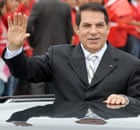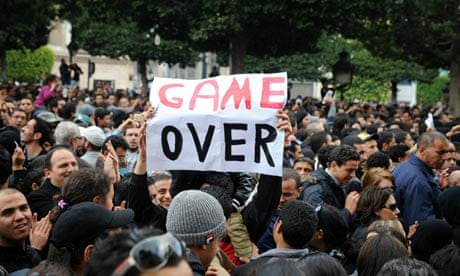Tunisia's president Zine al-Abidine Ben Ali has fled his country after weeks of mass protests culminated in a victory for people power over one of the Arab world's most repressive regimes.
Ben Ali had taken refuge in Saudi Arabia, at the end of an extraordinary day which had seen the declaration of a state of emergency, the evacuation of tourists of British and other nationalities, and an earthquake for the authoritarian politics of the Middle East and north Africa.

After hours of conflicting reports had him criss-crossing southern Europe by air, the Saudi state news agency confirmed he had arrived in the kingdom together with his family. Earlier, French media reported that Nicolas Sarkozy had refused Ben Ali refuge, although France denied that any request had been received.
In Tunisia, prime minister Mohamed Ghannouchi announced that he had taken over as interim president, vowing to respect the constitution and restore stability for Tunisia's 10.5 million citizens. "I call on the sons and daughters of Tunisia, of all political and intellectual persuasions, to unite to allow our beloved country to overcome this difficult period and to return to stability," he said in a broadcast.
But there was confusion among protesters about what will happen next, and concern that Ben Ali might be able to return before elections could be held. "We must remain vigilant," warned an email from the Free Tunis group, monitoring developments to circumvent an official news blackout.
Ben Ali, 74, had been in power since 1987. On Thursday he announced he would not stand for another presidential term in 2014, but the move came after Tunisia had been radicalised by weeks of street clashes and the killings of scores of demonstrators. Today in the capital police fired teargas to disperse crowds unmoved by the president's concession and demanding his immediate resignation. A state of emergency and a 12-hour curfew did little to restore calm. Analysts said that the army would be crucial.
Last night, soldiers guarded ministries, public buildings and the state TV building. Public meetings were banned, and the security forces were authorised to fire live rounds.
Tunis's main avenues were deserted except for scores of soldiers. Protesters, some of whom had earlier been beaten and clubbed by police in the streets, still sheltered in apartment buildings. Army vehicles were stationed outside the interior ministry. Opposition leader Najib Chebbi, one of Ben Ali's fiercest critics, captured the sense of historic change. "This is a crucial moment. There is a change of regime under way. Now it's the succession," he said. He added: "It must lead to profound reforms, to reform the law and let the people choose."
Al-Jazeera television reported that a unnamed member of Ben Ali's wife's family had been detained by security forces at the airport in the capital, Tunis. Le Monde reported later that a plane carrying Ben Ali's daughter and grandaughter had landed near Paris. Hatred of the president's relatives, symbols of corruption and cronyism, has galvanised the opposition in recent weeks.
Tunisians had been riveted by revelations of US views of the Ben Ali regime in leaked WikiLeaks cables last month.
The US led international calls for calm and for the Tunisian people to be given a free choice of leaders.
"I condemn and deplore the use of violence against citizens peacefully voicing their opinion in Tunisia, and I applaud the courage and dignity of the Tunisian people," said Barack Obama.
Tunisia timeline
1946 Tunisia becomes semi-autonomous state in the French Union
1947 Special ministry set up, with Tunisian officials making up the majority
1949 Habib Bourguiba returns to Tunisia to promote independence, having been forced into exile in 1945
1955 A government with only Tunisian members is installed
1956 Tunisia becomes an independent nation. The Neo Destour party wins a landslide election and Bourguiba is elected president of the first Tunisian national assembly
1957 For the first time, women are allowed to vote in regional elections. Tunisia becomes a republic and Bourguiba becomes its first president
1964 Swathes of mainly French-owned land is expropriated by the government, with the result that Paris stops all financial assistance
1975 Bourguiba is appointed president for life by the national assembly
1987 Ben Ali ousts Bourguiba in a coup, citing senility, and installs himself as prime minister
1989 Tunisia holds elections. Six opposition parties participate on this occasion but Ben Ali is elected president with 99% of the vote. His party, the RCD, wins all 141 seats in the national assembly
1994 Ben Ali is the only presidential candidate in 1994, winning 99.9% of the vote, drawing international condemnation
1998 Tunisia signs a landmark trade agreement with the EU
1999 Ben Ali receives 99.44% of the votes in the general election to win a third spell as the country's most powerful person
2002 Ben Ali amends Tunisia's constitution to allow a president to stay in power until the age of 75 and be re-elected unlimited times
2004 Ben Ali is re-elected once more, again receiving an unlikely 94.5% of the votes. Opposition party the Democratic Progressives withdraws two days before the vote, branding Tunisia's political system "a masquerade of democracy"
2006 A dozen hardline Islamists are killed in shoot-outs with security forces in the capital, Tunis. Lawyers say hundreds of people had been arrested on suspicion of links with terrorist groups since 2003, when the authorities gained new powers of arrest
2008 In the southern mining region of Gafsa, clashes break out between troops and young unemployed demonstrators
2009 Ben Ali re-elected as president for a fifth term, winning 89% of the vote
2011 Following violent protests throughout the country, Ben Ali reportedly flees Tunisia and the prime minister, Mohamed Ghannouchi, announces he has taken over as interim president
